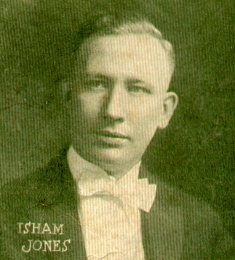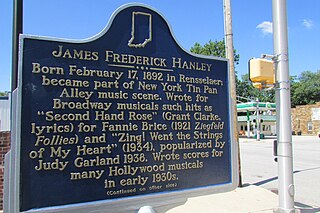Related Research Articles
This is a list of notable events in music that took place in the year 1948.

This is a list of notable events in music that took place in the year 1950.

This is a list of notable events in music that took place in the year 1928.
This is a list of notable events in music that took place in the year 1930.
This is a list of notable events in music that took place in the year 1924.
This is a list of notable events in music that took place in the year 1918.

Isham Edgar Jones was an American bandleader, saxophonist, bassist and songwriter.
James Vincent Monaco was an Italian-born American composer of popular music.
Con Conrad was an American songwriter and producer.

Harry Carroll was an American songwriter, pianist, and composer.

The Singing Fool is a 1928 American musical drama part-talkie motion picture directed by Lloyd Bacon which was released by Warner Bros. The film stars Al Jolson and is a follow-up to his previous film, The Jazz Singer. It is credited with helping to cement the popularity of American films of both sound and the musical genre.
Al Hoffman was an American song composer. He was a hit songwriter active in the 1930s, 1940s and 1950s, usually co-writing with others and responsible for number-one hits through each decade, many of which are still sung and recorded today. He was posthumously made a member of the Songwriters Hall of Fame in 1984. The popularity of Hoffman's song, "Mairzy Doats", co-written with Jerry Livingston and Milton Drake, was such that newspapers and magazines wrote about the craze. Time magazine titled one article "Our Mairzy Dotage". The New York Times simply wrote the headline, "That Song".
"Back in Your Own Backyard" is a popular song. Officially the credits show it as written by Al Jolson, Billy Rose, and Dave Dreyer; in fact, Billy Rose was exclusively a lyricist, Dreyer a composer, and Al Jolson a performer who was often given credits so he could earn some more money, so the actual apportionment of the credits would be likely to be music by Dreyer, lyrics by Rose, and possibly some small contribution by Jolson.
Harry Akst was an American songwriter, who started out his career as a pianist in vaudeville accompanying singers such as Nora Bayes, Frank Fay and Al Jolson.

Vincent Rose(néVincenzo Cacioppo; 13 June 1880 Palermo, Italy – 20 May 1944 Rockville Centre, New York) was an Italian-born American violinist, pianist, composer, and bandleader.
Ballard MacDonald was an American lyricist, who was one of the writers of Tin Pan Alley.
"Me and My Shadow" is a 1927 popular song. Officially the credits show it as written by Al Jolson, Billy Rose, and Dave Dreyer, with Jolson and Dreyer being shown on the sheet music as being responsible for the music and Rose the lyrics. Al Jolson was often given credits on sheet music so he could earn more money by popularizing them, but he played no actual part in writing this song. Jolson never recorded the song although he did use it in the touring version of "Big Boy" in 1927.

James Frederick "Jimmy" Hanley was an American songwriter and author.
Cliff Friend was an accomplished songwriter and pianist. A member of Tin Pan Alley, Friend co-wrote several hits including "Lovesick Blues", "My Blackbirds Are Bluebirds Now" and "The Merry-Go-Round Broke Down", also known as the theme song to the Looney Tunes cartoon series.
Abe Olman, born Abraham Olshewitz, was an American songwriter and music publisher. He composed a number of successful ragtime and popular songs including "Red Onion Rag" (1912), "Down Among the Sheltering Palms" (1915), "Oh Johnny, Oh Johnny, Oh!" (1917), and "Down By the O-Hi-O" (1920). He was later director of ASCAP, and a founder of the Songwriters Hall of Fame which, in 1983, named the annual Abe Olman Publisher Award in his honor.
References
- ↑ "Dave Dreyer: New York, New York". Death-Record. Archived from the original on January 10, 2013. Retrieved December 3, 2012.
- ↑ "Dave Dreyer". Songwriters Hall of Fame. Archived from the original on September 4, 2012. Retrieved December 3, 2012.
- ↑ "Dave Dreyer | Songs". AllMusic . Retrieved 2017-05-29.
- ↑ "Explore | Songwriters Hall of Fame". Songhall.org. Retrieved 2017-05-29.
- ↑ Bryon Young page on Ken Griffin and "You Can’t Be True, Dear" Archived 2009-02-13 at the Wayback Machine , theatreorgans.com; accessed May 28, 2017.